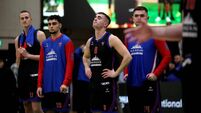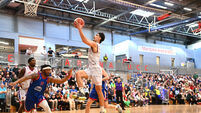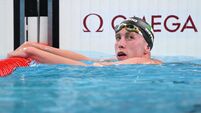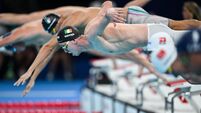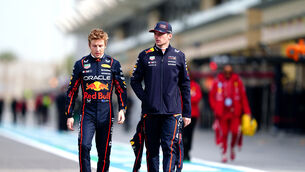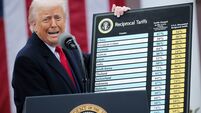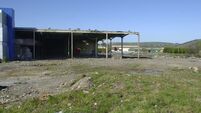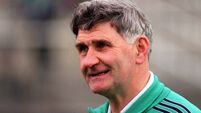Strong feelings - why the storied Demons-Neptune rivalry is now more heated than ever

THE BIG GUNS: Elijah Tillman celebrates a score for UCC Demons; UCC Demons vs Energywise Ireland Neptune in the Domino’s Pizza Men’s Superleague quarter final at Mardyke Arena, UCC, Cork. Pic Larry Cummins
If it was any other pairing it would be just a mere controversy, or more so a curiosity. A bit like that Limerick Eagles-Portlaoise Panthers saga of 12 months ago that had CNN and other international news agencies so bemused at the prospect of two sides having to reconvene to play the final 0.3 seconds of a game all over again.
But this isn’t just any pairing. It’s Demons-Neptune, easily the most celebrated and enduring rivalry in Irish basketball, and thanks in no small part to the latest twist in their intertwined history, easily the most intense.
In case you haven’t heard, the two Cork clubs played out a dramatic and for some, a traumatic, Superleague no.1 v no.8 quarter-final in UCC’s Mardyke Arena at the end of which Demons, the top seed, prevailed, 100-93.
Only the score was wrong. It should have been 98-93. Neptune played most of the match believing the scoreline was inaccurate yet being repeatedly told by the relevant match officials that it was not. They contend that if they had been working off the correct scoreline, their approach, especially in the closing minutes, would have duly differed.
And so after a successful appeal to Basketball Ireland’s National League Committee (NLC), they’ve been granted a replay. These two tribes will go to war once again. Same day (Sunday again), same place (the Mardyke).
There’s literally not a ticket to be had. It sold out in 12 minutes, quicker than the following Sunday’s hurling league final in Páirc Uí Chaoimh, even faster than Oasis in Croker.
Which is another reason why there’s some bad blood right now. Neptune claim they were given no notice that tickets were going on sale; that as a courtesy they should have been notified at least an hour beforehand. They calculate they will have only 40 members at the match after a committee member was able to snag a batch.
The Demons fanbase and club are similarly aggrieved that some of their volunteer members have been unfairly named and criticised on various social media platforms when the facts show they were hardly at fault.
It all stems from an error in the first quarter.
With 1.34 to go in that period, Demons’ left-handed American guard Patrick Robinson hit a three-pointer, prompting Neptune’s coach Pat Price to call a timeout. On Basketball Ireland’s streaming channel, the score correctly read 24-15 to Demons. It was also what the scorekeeper, Stephen O’Leary from Blue Demons, had it down as on his electronic pad.
But the scoreboard operator had 26-13. And when O’Leary alerted the well-regarded match commissioner of the discrepancy, the match commissioner whose rank superseded his told him with some conviction that she too from her notes had the score down as 26-13: he must have been mistaken.
It would take four minutes from the timeout for play to resume, with the teams working off the basis that it was 26-13 to Demons. A basket O’Leary had attributed to Neptune’s American Tamyrik Fields was to be struck off and granted instead to a Demons’ player, didn’t matter who.
The nature of that app and system is that the score goes to the lowest-numbered opposition player; and so in this case that Demons No.4 Scott Hannigan. And so following the commissioner’s instructions, O’Leary under duress followed the protocol and input the required data: Hannigan was awarded two points, even though he had yet to see the floor.
The game resumed but by now a sizeable contingent of the crowd were agitated, their focus distracted between trying to follow what was transpiring in front of them and trying to review what had transpired before Robinson’s three-pointer and Price’s timeout.
One of those parties was Neptune’s chairperson, Tom O’Sullivan. At the end of the first quarter he reviewed those opening 10 minutes again on one phone, writing down who had scored what and when. The official score was wrong: coming out of Price’s timeout it should definitely have been 24-15 instead of 26-13.
Shortly thereafter he approached Mark Scannell, the well-known Glanmire coach who in his playing career suited up for both Demons and later Neptune. Scannell was on the National League Committee. Was there something he could do? Scannell rang the league manager John Walsh who recommended that at half-time he approach the table and the designated match commissioner.
When he did though he was told, like O’Sullivan and various other parties, to back off. At half-time the referees and some table officials reviewed video and came out to declare that first-quarter basket of Fields should be reinstated. Yet for some reason Hannigan’s non-basket still stood. The issue was only half-fixed.
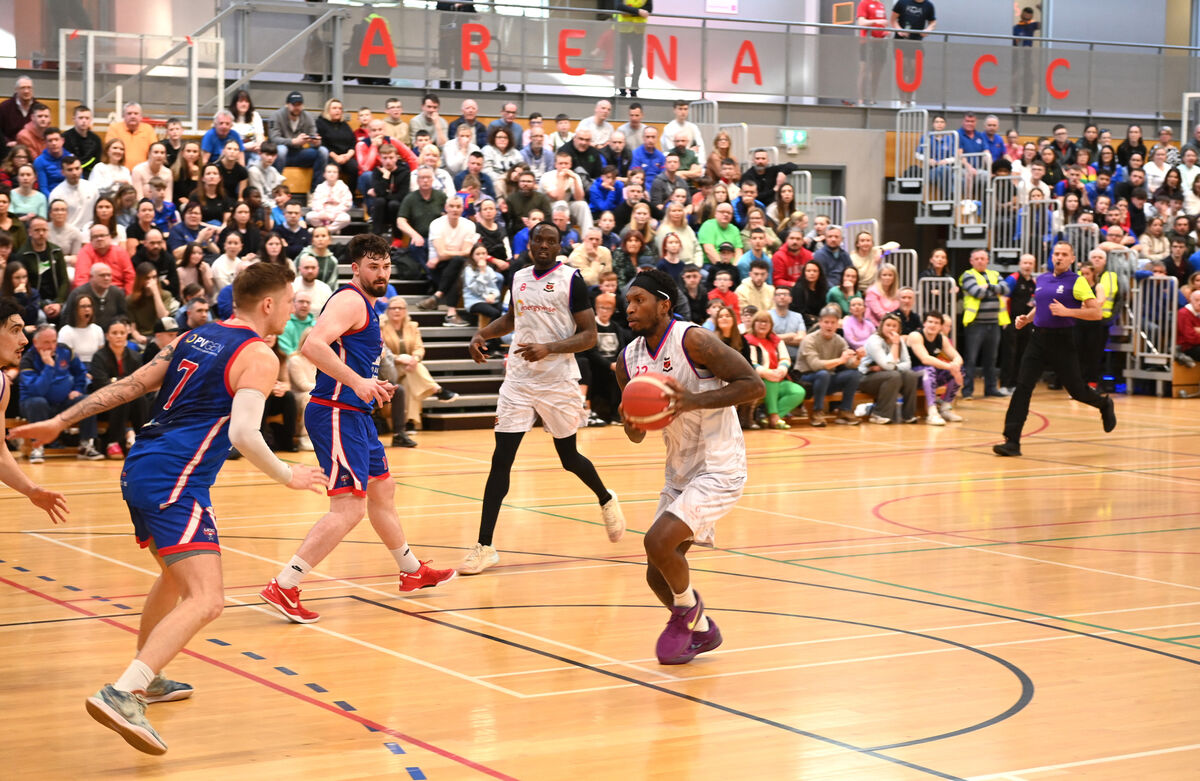
Neptune were magnificent in that second half. Rarely in the history of the rivalry have they ever been as clear underdogs as in Sunday’s match; they barely scrapped into the playoffs, with just a 12-12 record, while Demons had a league-best 18-6.
Midway through the third quarter, Field was fouled out after contentiously being hit with two unsporting fouls in quick succession for overly-protesting a non-call by the refs. Later their beloved Catalonian Nil Sabata also was controversially fouled out.
And yet with two minutes to go they were five points up, 92-87, or rather should have been seven points up. The game was theirs to lose.
And somehow they managed to do just that.
Demons were outstanding in those last couple of minutes. First Kyle Hosford nailed one of two free-throws. Then in the biggest clutch play of the game, James Hannigan, Scott’s older brother, claimed a defensive rebound and went all the way down the court to finish with his left hand and draw the and-one: he duly nailed his free-throw to bring Demons back to within one on the scoreboard.
And after that Neptune continued to come up with a series of empty possessions while Demons pounded the ball inside to Elijah Tillman.
That is why Demons being denied their victory doesn’t sit well with those who know the history of these clubs.
The most famous, infamous and influential game in Irish club basketball remains the clash of these two clubs in the 1985 National Cup final. The Neptune Stadium was only a month old. The National Cup itself was just a year old. It was the first televised weekend in the sport’s history.
With 3.31 to go Demons, inspired by Jasper McElroy, were seemingly in control, 89-82, when Terry Strickland fed Ray Smith under the basket for an easy two. Only for some reason it went down on the scoresheet and up on the scoreboard as three points. Before Demons knew it, Strickland was stealing the ball with eight seconds to go to lay up on the buzzer to give Neptune a 93-91 win that was later corrected to 92-91.
Demons were up in arms at the time. But their appeal failed. Neptune retained the Cup, the launchpad for the supremacy they would enjoy for the rest of the decade.
It still rankles with Demons folks to this day, but the more measured of them had long come to accept an inconvenient truth. In the clutch Neptune had outscored them 10-2. Strickland had shown why he would go down as one of the greatest closers in Irish basketball history. Demons’ Dale Roberts had four visits to the free-throw and failed to score on any of them. If sport is ultimately a test of who manages stress best, the harsh reality was that Strickland had passed it and Demons hadn’t.
Last Sunday the roles were reversed. As much as Neptune might have managed the last two minutes differently – keeping the ball, going for a two-pointer instead of a three-pointer – they should ultimately have managed it better. Instead they were outscored 13-1 in those final two minutes. By looking to replay this game, the have inadvertently undermined much of their legitimacy to that 1985 Cup triumph, the most important and celebrated in their and the sport’s history.
O’Sullivan and his committee though will feel their obligation is to the club and team of 2025, not to enshrine the memory of 1985. Which is why they urged team captain Roy Downey to sign the scoresheet under protest and send in an appeal to the NLC.
They did not expect to win their appeal. But they have, the NLC citing a particular FIBA rule.
The fallout has been bruising for all concerned, all volunteers. The match commissioner has stepped aside for this weekend, wondering like anyone else who serves in that capacity if it is worth it.
O’Leary, a son of the club chairman Michael, was on the receiving end of some ill-informed social media comments; it was he who first tried to resolve any error, not perpetuate it.
Scannell has been named and accused of being partial to Neptune on account of coaching them to their last Cup success in 2013. Scannell was fired 13 months later by the club. They’re a former club he had some great times with, just as he had great times with Demons winning a league as a player in 1989. He didn’t even attend the NLC’s decisive meeting last Monday; instead he was attending the funeral of Adrian Fulton’s mother.
Ultimately the NLC were right about one thing: it all came down to simple human error. Normally home teams sit on a certain side of the table but Demons in the Mardyke tend to make an exception. Did the match table operator out of habit award two points to the home team when in this case should have gone to the away one? We’ll never know.
What we do know is that the referees will need to be both stern yet sensible in officiating this replay. You can’t tee players on a whim. When you’re sitting on a powder keg like this you don’t toy around with any match.
For this isn’t any match or any pairing.
It’s as heated as it’s ever been in as heated a rivalry as Irish sport has.

